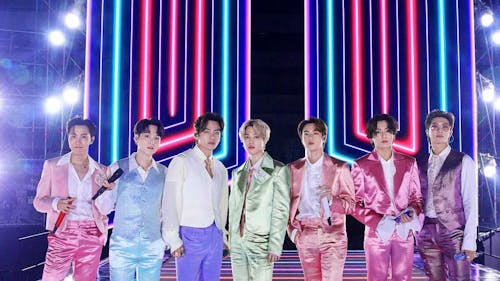BTS’ new release 'BE' is heartfelt, best pandemic album yet

While many artists have released music during the coronavirus disease (COVID-19) pandemic, BTS' new project "BE" might just be the best pandemic album yet.
Following the explosive success (pun intended) of “Dynamite,” which just earned BTS their first nomination at the Grammy Awards, the septet released their highly anticipated studio album, "BE." The project, released Nov. 20, offers eight diverse, heartfelt tracks that the members refer to as “a record of the present."
For the South Korean megastars, the “present” is a separation from who they love the most: their fans. The majority of the promotion cycle for their last album, "Map Of The Soul: 7," took place in front of an empty audience. Weeks later, BTS' worldwide "Map Of The Soul" tour was canceled. Since then, the closest the group has gotten with their beloved ARMY fanbase is through webcams.
Devastated, the members opened up about the emotional tolls of dealing with the pandemic. Leader of the group, RM, said tearfully in a livestream: “I’d start yelling and feel so much anger because I was feeling dejected. I was upset and felt like there wasn’t much we could do realistically."
He then said, “But we must keep moving forward. What else can we do?” And move forward they did.
After the initial disappointment settled, determination took its place, and the seven members of BTS got to work.
In an effort to stay connected with fans while making their new album, BTS shared the entire process via periodic livestreams, from the first ideas for the track list to unboxing the completed album six months later.
Unlike past works, the album isn’t a large-scale project crafted through tight (and highly confidential) planning. It’s sincere and understated, a beautiful narration of this moment in time, hence its title. On top of all that, it's the band's most self-made and sonically unique album to date.
BTS switched out heavy production and processing for organic minimalism, opting for bops that fill up a room instead of bangers that fill up a stadium. (After all, there won't be any stadiums to fill up with music for a while.)
It’s as though BTS decided since they couldn’t meet fans in concert, they would do the next best thing and meet them through music. So it’s fitting that, in essence, "BE" is BTS personified. It’s the band as a whole, packed into 28 minutes of music.
When held up to a prism, the album shines as seven distinct colors — seven members, with seven musical styles, conveying seven emotions. Together, they form a single beam of warm light that radiates with comfort and hope.
The album begins mellow with “Life Goes On,” a guitar-filled title track that sets the theme of "BE." With lines such as “like an echo in the forest / the day will come back around,” BTS submerges us in nature and reminds us that, no matter what, this too shall pass. It’s a soothingly simple message that feels like a much-needed hug.
As RM said to Esquire, the song represents him well, making his color the first to stand out on "BE." RM’s solo songs like “everythingoes” and older BTS tracks like “Spring Day” share similar themes of ephemerality.
The parallels between “Life Goes On” and “Spring Day” run especially deep. Like “Life Goes On,” the 2017 release is sentimental and genre-bending, filled with imagery. Both songs have tragic contexts — the coronavirus pandemic and the Sewol ferry disaster, respectively — but they can just as easily stand alone with a universal meaning.
The songs are timely and also timeless. That duality was a large part of what eventually made “Spring Day” the longest-charting song in Korean history, and we can anticipate that “Life Goes On” will share a similar legacy.
The album continues with the deceptively buoyant “Fly To My Room,” which is the most overtly quarantine-centric song on the tracklist. The song begins with band members V and Jimin going back and forth in a dialogue of falsettos, while members Suga and J-Hope come in with bouncy rap verses.
Together, the four of them express an array of thoughts centered around the lyric, “this room is all I have.” The song introduces a Jimin-esque attitude toward hardship to the album — one that’s a bit playful, a bit cynical and extremely relatable.
“Blue & Grey” is the raw, vulnerable tearjerker of the album (it’s not a BTS album without at least one.) Written by V and reminiscent of his solo tracks “Sweet Night” and “Winter Bear,” this poignant ballad is the emotional highlight of the project.
Intertwined with a mix of guitar and violin, V's lyrics face loneliness and depression head-on. The song acts as a spot of introspective repose before the album takes a turn toward its up-tempo second half.
The latter part of the album is ushered in by the track "Skit" which features the members’ joyful reactions to “Dynamite” hitting #1 on the Billboard Hot 100. The track serves as a much-needed mood-boost for the listener, just as the achievement did for BTS.
From here, the album transitions to Suga’s contribution, a groovy retro number called “Telepathy.” It’s a song addressed specifically to ARMYs, centering around missing good times with loved ones and referencing metaphors the band frequents in many of their songs. “Let's have fun together, remembering together / a small island in the middle of the blue sea,” sings Jungkook, with cheerful confidence.
“Dis-ease” keeps up the pace with an old-school hip-hop beat that's embellished with funky brass, courtesy of J-Hope’s writing and production. The song is suave but packs a punch, especially in its last minute, with what can only be described as one of the best bridges in recent music history.
The members speak to their love-hate relationship with work — an occupational “disease” and “dis-ease” — juxtaposing the dreariness of such a topic with fast-paced, exhilarating melodies and instrumentation.
If "BE" was a concert, its final two tracks would be the encore. “Stay” is the closest we get to the aforementioned stadium banger, highlighting vocalists Jungkook and Jin, and rapper RM. It’s a future house anthem that gives fans a small reassurance through its lyrics: “We’re far apart physically, but we always stay together.” Originally slated to be the title track of Jungkook's mixtape, the song is his glowing moment on the project.
Disco-pop hit “Dynamite” follows, rounding out the album with a shining optimism characteristic of the seventh and final piece of the puzzle: Jin. As a standalone single, “Dynamite” began as the bright, energizing song of the summer we all needed. But in the context of the album as a whole, the track feels more like a rolling-credits song, ensuring BTS’ quarantine story ends on a high note.
When BTS set out to produce this album, they had a simple mission in mind: "We just wanted listeners to know that we truly understand them and are feeling the same way,” RM said in an interview with HITS 97.3. “We hope they just feel comforted and consoled by our music.”
Mission accomplished. With "BE," BTS takes listeners on an emotional journey that starts with a promise of a light at the end of the tunnel and ends with a taste of that light. In between is a sampling of everything the artists have to offer, both as musicians and as people.
From start to finish, the album is strikingly candid, without a loose end. Every low has its equal and opposite high, every statement of despondence has a counterargument of hope.
Above all else, this Newtonian formula of balance is what makes BTS’ music so satisfying, and what makes "BE" such a successful project. It’s a flawless, well-rounded album that, even after these difficult times are over, we’re sure to keep coming back to.



